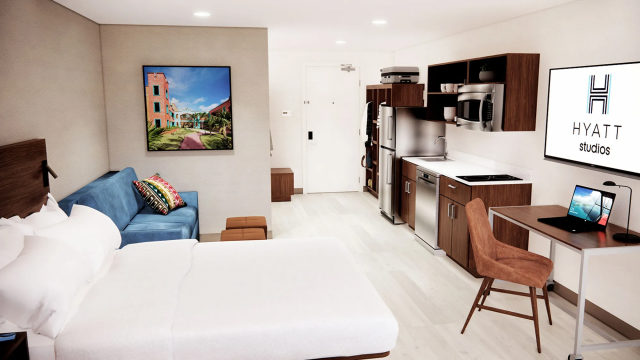Hoteliers make big investment in midscale and extended stay
2023-05-08Prior to the pandemic, an outsize portion of new hotel brand launches sat within one of two camps: luxury and lifestyle.
As the pandemic wanes, however, the pendulum appears to be swinging in the opposite direction, as the industry sees a flurry of new brand activity skewing toward more accessibly priced segments, including midscale and extended stay.
Robert Cole, Phocuswright’s senior research analyst for lodging and leisure travel, said this shift toward the other end of the pricing ladder suggests that “the hotel industry is getting pragmatic” when it comes to diversifying its brand offerings.
“I think a lot of developers were getting very aspirational,” Cole said. “Because it’s cool to develop boutique hotels or nice luxury hotels. But there’s been a bit of a wake-up call that these types of properties are very expensive to build and to operate, and they’re labor-intensive.”
And based on the sheer volume of new midscale and economy brands making their debut in recent months, the industry’s biggest players appear to be taking such cost concerns seriously.
Earlier this year, Hilton unveiled its first economy flag, Spark by Hilton, which the company said would play in a “premium economy” space. Shortly after, Hilton CEO Chris Nassetta announced that the company was also preparing the launch of a lower-midscale extended-stay brand, which would offer a price point just below Home2 Suites.
Likewise, in mid-April, Hyatt Hotels Corp. unveiled Hyatt Studios, an extended-stay flag that the company called its first foray into the upper-midscale space.
Then, last week, Marriott International joined the fray, with CEO Anthony Capuano teasing the forthcoming launch of a midscale extended-stay brand, which he said would be a “simple, modern, streamlined, newbuild product.”
That announcement came just as Marriott officially closed its deal to acquire City Express from Mexico’s Hoteles City Express, marking the company’s entry into the midscale segment. During the group’s recent first-quarter earnings call, Capuano said Marriott sees “immediate opportunity to accelerate the growth of City Express” in the Caribbean and Latin America.
Phocuswright’s Cole expects developer interest for these types of select-service offerings to be especially heightened amid the current macroeconomic landscape.
“For developers looking to build new hotels, with higher interest rates, there’s more risk,” Cole said. “There’s also economic uncertainty and concern about whether there’s going to be a recession, so to do larger, full-service projects is just riskier.”
And it’s not just hotel owners and developers looking to potentially pull back on the investment front. Although Hilton, Marriott and Hyatt, generally speaking, have yet to report any major slowdown in pent-up demand, most industry insiders are predicting some level of consumer impact from economic turbulence later this year.
“We do expect things will slow down,” Nassetta said during a late-April call with analysts. “You’re going to continue to have a slowing of the broader economic environment; that, at some point, has to have some impact on us.”
Lindsey Roeschke, a travel and hospitality analyst at business intelligence firm Morning Consult, also said that consumers may soon tighten their travel budgets.
“Economic concerns are very potent for travelers right now,” Roeschke said. “People aren’t necessarily in a place to splash out as much on travel. And while I would love to say that that’s a short-term concern for the industry, I don’t think that that’s the truth.”
Roeschke also pointed out that the recent flurry of new midscale and economy brands comes just as Gen Z travelers — the majority of whom make less than $50,000 per year — are entering the market in earnest.
“Their entry to the category was delayed because of the pandemic, and now they’re starting to travel,” Roeschke said. “They’re also more likely to be lower income, just by nature of their age and lack of spending power, but that’s not stopping them from traveling. And they need to stay somewhere. So, there seems to be a great opportunity there for these hotel chains.”
Extended stay’s edge
That most of these midscale plays are also in the extended-stay space is likely no coincidence, due to trends outside the economy.
Extended-stay concepts, which typically incorporate a kitchen or kitchenette as a key component, tend to have an edge when it comes to attracting bleisure travelers, and hospitality companies have taken note, according to Roeschke.
“People blending business and leisure occasions [tend to] draw out their trips a little bit longer,” Roeschke said. “And that’s something that has real staying power.”
Additionally, extended-stay hotels have the benefit of being able to compete more directly with vacation rentals, with the latest crop of newcomers also looking to inject some excitement into the segment.
Hyatt, for example, is promising that its Hyatt Studios concept will combine the “coziness of a studio apartment” with the energy of “a creative studio,” in addition to incorporating contemporary design elements.
“Extended-stay hotels have not traditionally had the greatest cachet,” Roeschke said. “But I think, now, the growth and popularity of vacation rentals, which do more often have that ‘cool factor,’ has really challenged the traditional brands to find a way to play in that space.”
Courtesy of Travel Weekly


